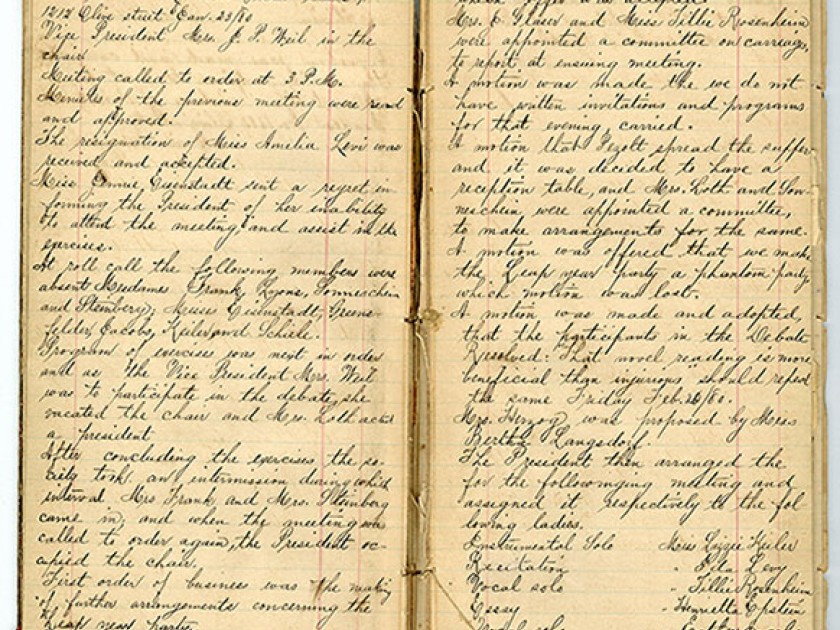
Pages from the October 17, 1879 – May 6, 1881 minute book of the Pioneers. Printed with permission of the Missouri Historical Society, St. Louis.
In the last quarter of the nineteenth century, in an era when few people went to high school let alone college or university, literary societies and culture clubs appeared across the United States. In almost every town and city, women and men who wanted to advance their educations met regularly to discuss books, hear lectures, and improve themselves by learning from one another. Although some clubs brought men and women together, many, if not most, were segregated by gender as well as class and faith.
On a winter day in St. Louis in 1879, Rosa Sonneschein gathered a group of friends and acquaintances and founded the first Jewish women’s book club in the nation: the Pioneers.
No one remembers the inspiration for this name. Maybe they chose it because some were pioneers in America — immigrants from the Old World making lives in the new. Rosa herself was one such member. Born Rosa Fassel in Hungary in 1847, she married Rabbi Solomon Sonneschein when she was just seventeen and he was twenty-five. In 1868 they set off for America, and a year later he became rabbi of St. Louis’s Reform synagogue, Congregation Shaare Emeth.
In her new home, Rosa occupied herself raising her four children, and leading ladies’ meetings and choral groups at the synagogue. Eventually she would become a journalist and the founder of the first English-language Jewish women’s magazine, The American Jewess.
But even before she embarked on that career, Rosa found intellectual stimulation in the Pioneers. At their first meeting, the club elected officers, agreed to meet every other week in each other’s parlors, and declared that no men were allowed. A committee began drafting a constitution and bylaws. Minute books, written in beautiful script, are filled with motions “moved, seconded, and approved.” The members — most surely Reform Jewish women affiliated with Shaare Emeth — took the club seriously, although they also wanted to enjoy themselves. The motion to fine members arriving fifteen minutes late passed; motions to fine “unruly members” and dispense with coffee during the intermission did not.
The Pioneers soon expanded their horizons with musical performances and readings. They also held debates, in which they considered both philosophical questions and current issues. Was reading novels injurious to one’s character? Should women vote? Which had better served mankind, ancient Jewish or ancient Greek civilization?
In 1891, Laura Jacobson became the Pioneers’ president. This former high-school class poet had married a leading St. Louis physician, and the society pages called her one of the “most prominent Jewish ladies of the city.” But Jacobson was interested in more than social standing. In September 1893, she spoke about anti-Semitism at the Jewish Women’s Congress during the Chicago World’s Fair.
She also redirected the Pioneers to devote an entire year to one subject. Two members were assigned to prepare research papers to read at each meeting. The Pioneers chose Jewish history for one of their first themes. Their papers covered the Babylonian exile, Jews under Roman rule, differences between Judaism and Christianity, Muhammed’s debt to Judaism, and philosophers like Moses Maimonides and Moses Mendelssohn.
But Jacobson was interested in more than social standing. In September 1893, she spoke about anti-Semitism at the Jewish Women’s Congress during the Chicago World’s Fair.
Eighteen-year-old Alice Drey, newly elected to the group, researched the 1807 Sanhedrin that Napoleon convened to legislate for French Jews. Seventy years later, her children recalled how frantically she would work on each paper, and how much they would look forward to the evening after she had read it. Then they could reclaim their mother — until it was time for her to write the next one.
Presumably, many of the Pioneers’ husbands and families supported their club work. But not everyone was enthusiastic about women’s literary societies. Critics contended that they led women to stray from their proper sphere and ruined homes. A cartoonist depicted a clubwoman, lounging about with drink and cigarette in hand and reading a book, while her husband washed the dishes and her scruffy children quarreled.
Despite these objections, the Pioneers and thousands — if not tens of thousands— of literary clubs flourished. Some years the Pioneers read particular authors. In 1907, when they were reading Leo Tolstoy, Alice Lippman (née Drey) wrote the author with a question about Anna Karenina. He wrote back, but didn’t answer it. Other years were given over to a genre, like drama or detective fiction. At other times, current events took precedence. During World War II, threatened with the end of their way of life, the women studied American democracy. In 1960, as colonial regimes were collapsing across Africa, they examined the “awakening continent.”
Today, the Pioneers are still going strong. They meet not in parlors, but at St. Louis’s Reform synagogue, Temple Emanuel. One new member recently reflected that in some book clubs, kibitzing and schmoozing get equal billing with the book — but not at the Pioneers. Although the group once considered admitting men, it has not. However, in 1970, the Future Directions Committee decided that ethnicity and religion were irrelevant for vetting new members. What was required was for a “girl” to want to learn. Still, most of today’s Pioneers are Jewish women.
This year, the club will explore American identity: what does it mean to be an American today? They plan to read David Henry Hwang’s Yellow Face and Mohja Kahf’s The Girl in the Tangerine Scarf. By examining a burning question of the moment, today’s Pioneers follow in the footsteps of their founders 140 years ago.
Pamela S. Nadell is the Patrick Clendenen Chair in Women’s and Gender History and director of Jewish studies at American University. Her works include the 2019 NJBA Jewish Book of the Year, America’s Jewish Women. She lives in North Bethesda, Maryland.